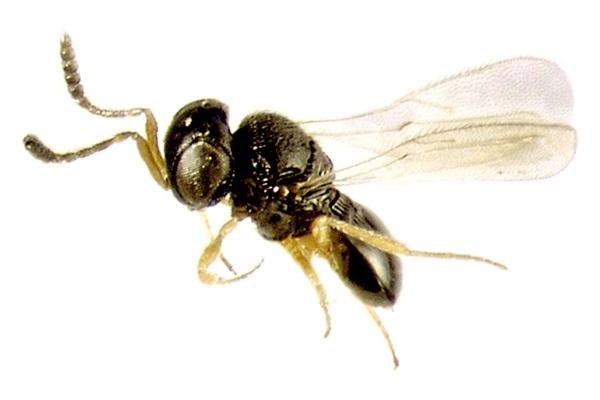
Credit: CABI
A group of scientists have confirmed the first report of an egg parasitoid Telenomus remus in Africa which could prove an important biological weapon in the fight against the devastating fall armyworm (Spodoptera frugiperda) that threatens the food security of more than 200 million people.
Dr Marc Kenis, Head of Risk Analysis and Invasion Ecology at the CABI Centre in Switzerland, led an international team of researchers from seven countries, who suggest Telenomus remus provides a ‘great opportunity for the rapid deployment of a biological control agent’ for fall armyworm in Africa.
The scientists, who confirmed the presence of Telenomus remus in Benin, Côte d’Ivoire, Kenya, Niger and South Africa using DNA analysis and morphological observations conducted at CABI’s Egham laboratories and the Natural History Museum London, say the species could be a vital ‘tool’ within an Integrated Pest Management strategy for fall armyworm which – as part of preliminary estimates in 12 of Africa’s maize-producing countries – has the ability to cause yield losses of up to 20.6 million tonnes per annum.
The team report in a new paper published in Insects that surveys should now be carried out throughout Africa to assess the present distribution and impact of Telenomus remus on the continent.
They go on to suggest that augmentative biological control options using the parasitoid should be considered and call for classical biological control which should focus on the importation of larval parasitoids from the Americas.
Dr Kenis said, “The frequent application of broad-spectrum insecticides is not only unsustainable in the long-run, but also increases production costs, has biodiversity and environmental impacts, and poses health risks to the growers and consumers. Biological controls can offer an economically and environmentally safer alternative to synthetic insecticides that are currently being used for management of the fall armyworm.
“Consequently, various biological control options are presently being considered, including the introduction of Telenomus remus, the main egg parasitoid of the fall armyworm in the Americas, where it is also used in augmentative biological control programmes.
“It is important to discourage the use of highly hazardous synthetic pesticides, and to develop, promote and deploy proven, sustainable IPM technologies against fall armyworm.”
The scientists state that they are not aware of how and when Telenomus remus arrived in Africa but are confident that it arrived before the fall armyworm as a specimen was collected in Kenya in 1988. They argue that Telenomus remus could have remained unnoticed on other hosts for a long time because the adults are ‘extremely small and difficult to distinguish and identify on a morphological basis.’
Dr Kenis added, “In Latin America, field releases of Telenomus remus in maize can result in 80-100 percent parasitism, providing full control of fall armyworm”.
“The main challenge for a wider utilisation of Telenomus remus is to provide a product that is financially affordable for African farmers. Mass production on its natural hosts is costly but rearing systems on factitious hosts can be developed.”
###
Additional information
Photo: image shows an adult Telenomus remus (Copyright: G. Goergen, IITA)
Full paper reference
Kenis, M., du Plessis, H., Van den Berg, J., Niango Ba, M., Goergen, G., Kwadjo, K.E., Baoua, I., Tefera, T., Buddie, A., Cafà, G., Offord, L., Rwomushana, I., Polaszek, A. 2019. ‘Telenomus remus, a candidate parasitoid for the biological control of Spodoptera frugiperda in Africa, is already present on the continent’. Insects, DOI:10.3390/insects10040092
The paper is available as an Open Access document and can be viewed here: https:/
Funding
This study was financially supported by the Department for International Development (DFID), UK and the Directorate-General for International Cooperation (DGIS), Netherlands through CABI’s Action on Invasives programme. The Maize Trust contributed to funding of field surveys of S. frugiperda in South Africa. The sample collection in Kenya was supported by funds from USAID Feed the Future IPM Innovation Lab, Virginia Tech. and in Benin by the Gesellschaft für Internationale Zusammenarbeit (GIZ).
Fall armyworm portal
The fall armyworm is a Lepidopteran pest that feeds in large numbers on leaves and stems of more than 80 plant species, causing major damage to maize, rice, sorghum, sugarcane but also other vegetable crops and cotton. Find out more about this crop pest on the Fall armyworm portal.
Media Contact
Wayne Coles
[email protected]
Original Source
https:/
Related Journal Article
http://dx.




